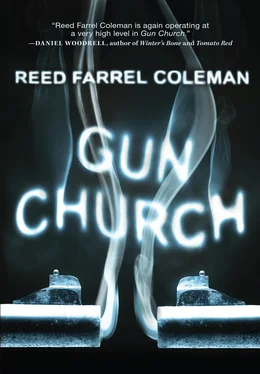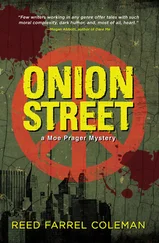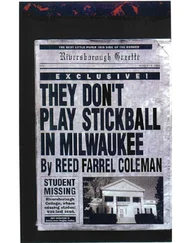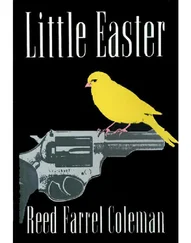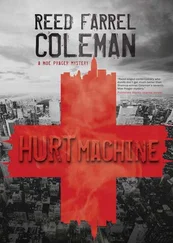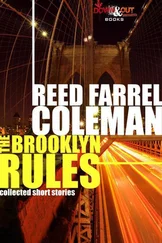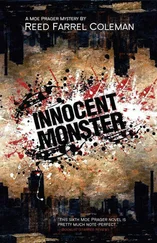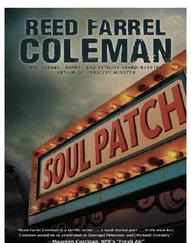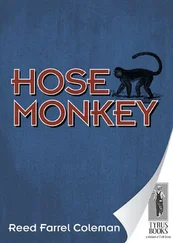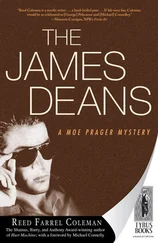Reed Coleman - Gun Church
Здесь есть возможность читать онлайн «Reed Coleman - Gun Church» весь текст электронной книги совершенно бесплатно (целиком полную версию без сокращений). В некоторых случаях можно слушать аудио, скачать через торрент в формате fb2 и присутствует краткое содержание. Жанр: Триллер, на английском языке. Описание произведения, (предисловие) а так же отзывы посетителей доступны на портале библиотеки ЛибКат.
- Название:Gun Church
- Автор:
- Жанр:
- Год:неизвестен
- ISBN:нет данных
- Рейтинг книги:3 / 5. Голосов: 1
-
Избранное:Добавить в избранное
- Отзывы:
-
Ваша оценка:
- 60
- 1
- 2
- 3
- 4
- 5
Gun Church: краткое содержание, описание и аннотация
Предлагаем к чтению аннотацию, описание, краткое содержание или предисловие (зависит от того, что написал сам автор книги «Gun Church»). Если вы не нашли необходимую информацию о книге — напишите в комментариях, мы постараемся отыскать её.
Gun Church — читать онлайн бесплатно полную книгу (весь текст) целиком
Ниже представлен текст книги, разбитый по страницам. Система сохранения места последней прочитанной страницы, позволяет с удобством читать онлайн бесплатно книгу «Gun Church», без необходимости каждый раз заново искать на чём Вы остановились. Поставьте закладку, и сможете в любой момент перейти на страницу, на которой закончили чтение.
Интервал:
Закладка:
“Shut up, Stan,” the deputy said. “And, Professor, I think we could use a little less of your lip at the current moment. Okay?”
“Okay.”
“Now what the hell was goin’ on here?”
“Nothing,” I said.
“Stan?”
“Nothing.”
“So, that’s the way it’s gonna be, huh?” the deputy said, shaking his head. “Have it your way, boys, but next time I’ll haul both your asses in. Professor, why don’t you take this opportunity to depart?” It wasn’t a suggestion.
Jim made sure to keep himself between Petrovic and me as I walked out.
“Remember, hero, this ain’t over,” Stan said as we passed.
I caught a glimpse of Jim’s face. He wanted me to say something. I could see it in his eyes and for some reason it was suddenly important for me not to disappoint the kid.
“Yeah, you’re right, Stan. It isn’t over. You started it, but I’ll finish it. Next time it won’t be me they’re peeling off the floor. Remember that.”
Out on the street, I took a few deep lungfuls of Brixton’s best. Jim was holding on to my elbow, walking me away from the diner.
“That was great in there, Kip,” he said.
“The part where I curled up in a ball like an insect?”
“The first punch. Do you know how many people in this town would like to pop Stan Petrovic one? You actually did it.”
“Yeah, Jim, but you heard him in there. He’s going to kick my ass sooner or later.”
“Or, like you said, maybe you’ll kick his.”
“That was just my anger talking.”
“No way,” he gushed. “Are you on campus tomorrow?”
“Freshman Comp at nine fifteen,” I said.
“Meet me by the student union after class.”
“Why?”
“So we can go hit some balls.”
Eight
My writing didn’t suck. I couldn’t believe it, but it really didn’t suck. I read and reread and re-reread the pages I put down in between the long bouts in bed with the St. Pauli Girl. It didn’t suck because what I was reading wasn’t recognizable as the Kipster’s, and that was all to the good. The Kipster was dead, not risen, and I was all that remained in his place.
The Kipster was a cynical bastard, full of high sentence, but never obtuse: a poet, a prince looking down upon the great unwashed with only contempt. He was above it all, untouchable and untouched. He was master of his instrument, so much so that it was all an inside joke to him. I didn’t recognize the writing because it came from a very different place than from where the Kipster’s art had come. It all came too easily for the Kipster, which is why he foundered when the words stopped coming to him on the cusp of the ’90s. I had nothing to hold on to but the empty shell of the Kipster. His old protagonists were whimsies and straw men, put up like bowling pins only to be knocked down. They were sacrifices meant as meat for elitist snobs. His protagonists were soulless, ironic follies to be run up the flagpole like a fat girl’s underthings.
Other than a complete loss of talent, one of the reasons I’d managed but seven first lines in all these years was the very nature of the man I thought of as McGuinn. He was a real man, not a construct. There was nothing about his bloody and violent life that even remotely resembled Kant Huxley’s or any of the other cool-boy protagonists that had flowed from the Kipster’s fingertips. The other things that had daunted me for so long were setting and form.
I wasn’t a biographer, not in temperament or by training, but what McGuinn had given me was basically the details for the biography of a murderer. The killings-their mechanics, the reasons and rationalizations behind them, the stories of the victims-as fascinating as some readers might have found those things, weren’t what interested me. Nor, do I think, were they what motivated McGuinn. It was his emotional journey and evolution from teenage murderer to soldier to assassin to target that got my attention. Besides, I’d spent all of two months in Ireland and the North. I didn’t know the place or the people, and I certainly had only a superficial understanding of the conflict. I’d been a glorified tourist, nothing more. A mostly drunk one at that. Even if I’d been up to the writing, I didn’t understand the context.
Just because I lost my talent for writing didn’t mean I’d lost my instinct for good work and a good story. I still had an eye and ear for fine ingredients even if I had lost the recipe. And McGuinn’s life had all the best ingredients. Whenever I imagined the book, I imagined it as fiction with Terry McGuinn in an alien setting. What could I have added to something set on the streets of Belfast? Nothing. If I wanted to give meaning to this man’s journey, he needed to be a stranger in a strange land. But until the St. Pauli Girl brought me to that old hangar and anointed me with gunpowder, I had no idea of where that strange land would be. It was those shots-the sight of Jim Trimble’s still body and the fat kid rolling around, the church pews, the spray of beer, the landscape of Jim’s scars-that had, after so long, helped me to arrive at a destination.
What a perfect concept, I thought. An assassin being hunted by his enemies and his brothers alike ends up hiding in an unremarkable place in the center of nowhere. Yet even in this netherworld, he cannot escape the blood. The contrast was delicious, because the violence McGuinn finds isn’t born of passion or religious hatred, but of boredom and sport. A man who was certain he understood violence and blood as well as any who had ever lived is thrust into a world he can’t fathom. Now that was something I understood, being exiled in a world that defied my comprehension.
It was a place to start, but I wouldn’t be satisfied to simply use what little I had seen at Hardentine Air Force Base, nor did I want to confine my characters in a concrete bunker. No, the fictionalized McGuinn needed to operate against the backdrop of the real world, even if it was a withered and tiny speck of the world. He was too large a character to stick in a box somewhere and duel like a gentleman. Red crosses on dirty T-shirts might have been dramatic enough for the boys and girls from Brixton, but they would not suffice for a killer like McGuinn. In my novel, there would be blood, lots of blood, and very little of it spilled for a good cause. First things first. I had to get McGuinn involved with the wrong people. No better way to do that, I thought, than with the noir conceit of a beautiful woman.
He thought he’d go feckin’ mad, did Terry McGuinn. He could put a rifle round through a man’s ear hole at several hundred meters or build an IED out of household chemicals and a plastic bottle, but he was banjaxed by his loneliness. It was his curse to have been born a social sort. The Prods would say it was a curse he was born at all. When he’d been forced to lay low in the States in the past, there was always someone to share a pint of the black stuff. As an honored soldier of the Republic, he was seen to. Now he was a scurrying rat, hiding from the shadows in his bedsit above a novelty shop. And just lately the walls of the bedsit had been closing in on him.
Och ocon-“woe is me” were the words that had recently seeped into his thoughts, and he despised himself for letting them in. McGuinn was not a man to rue the trail of blood that followed him across the Atlantic, nor to pray the rosary before a shrine to his victims. Soldiers and innocents, it was all the same shite. In the end, we all got off the train at the same station. But even assassins fall prey to the blues and he had ’em fierce. “Jaysus,” he thought. What he wouldn’t give for a pint and a chat without having to look over his shoulder.
Читать дальшеИнтервал:
Закладка:
Похожие книги на «Gun Church»
Представляем Вашему вниманию похожие книги на «Gun Church» списком для выбора. Мы отобрали схожую по названию и смыслу литературу в надежде предоставить читателям больше вариантов отыскать новые, интересные, ещё непрочитанные произведения.
Обсуждение, отзывы о книге «Gun Church» и просто собственные мнения читателей. Оставьте ваши комментарии, напишите, что Вы думаете о произведении, его смысле или главных героях. Укажите что конкретно понравилось, а что нет, и почему Вы так считаете.
